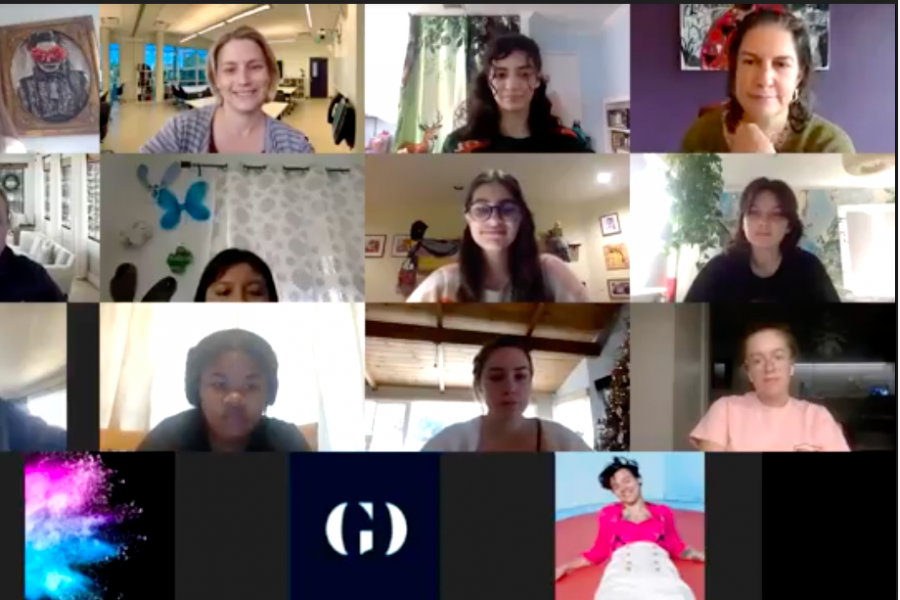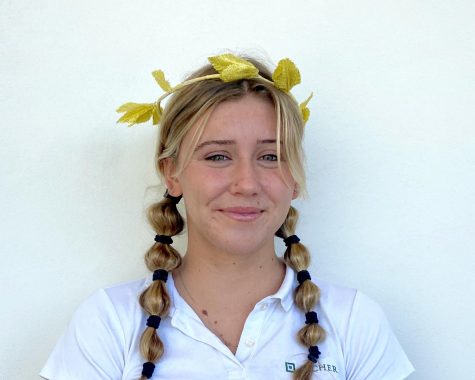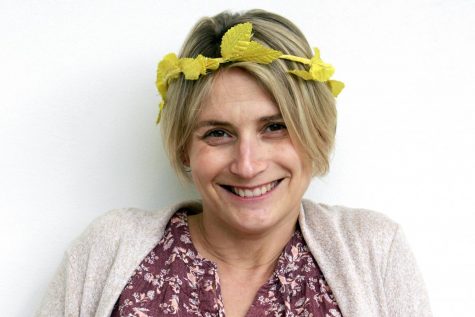Playwright Karen Zacarías joins Archer community for Q&A
Photo credit: Kristin Taylor
Award-winning playwright Karen Zacarías (top right) joins junior english class and advanced theater students, along with other members of the archer community, on a Zoom to answer questions about her play “Native Gardens” and her career as a playwright. Zacarías is from Mexico and has won awards for her work, including the National Latino Playwriting Award.
December 19, 2020
The play “Native Gardens” follows the story of two couples living in Washington D.C on opposite sides of a fence, which becomes a neighborly border dispute that reveals greater problems of microaggressions and misunderstandings. The writer of “Native Gardens” and one of the most produced playwrights in the country, Karen Zacarías, joined a Zoom with the Archer community to answer questions about her play, career and perspective as a Latina playwright.
The Zoom was hosted by English teacher Kristin Taylor and was attended by Taylor’s junior English class, the advanced theater class and members of Hermanas Unidas as well as anyone in the Archer community who wished to join.
“My biggest takeaway is how much we need to see diversity on stage and how important it is that there are more people writing plays that represent a diverse audience,” junior Zoe Bush, who co-led the Q&A session, said. “We need to trust that people want to see diverse stories and want to hear their stories told and I think it’s one of the most important things to do is making the arts diverse.”
Zacarías founded Young Playwright’s Theater, which teaches playwriting to children in public schools in the Washington D.C area. On the Zoom, she discussed her journey as a playwright and how she becomes inspired to write her plays as well as the process she follows when putting them together.
“She was incredible. I was so inspired by everything that she spoke about, her comments about the writing process and how accessible it can be,” world language teacher and advisor of Hermanas Unidas, Talia Geffen said. “Part of the importance of writing as a tool for youth, and for young people, [is] to have kind of agency, especially when you’re in a situation like she was as a young immigrant with not a lot of power.”
Taylor’s English class, called Literature of the American Self, explores, through literature, the idea of what it means to be an American and the concept of racial identity. Students in the class read and discussed Zacarías’ play “Native Gardens” as part of the curriculum, and did research on her career prior to the Q&A session.
“I asked her if she had to Americanize any of her pieces and she said yes – I think that’s what we don’t really realize is how much we Americanize ourselves to kind of fit into our societies,” junior Destiny Morado said. “I think that in [English] class, we focus on a lot of pieces that show us that it’s okay to kind of fall outside of these barriers and these kinds of societal norms.”
Bush echoed Morado’s statement, noting how reading the play and taking part in the Q&A session added to her concept of what it means to be American.
“In the play, there’s this concept of American doesn’t mean United Statesian, and I think we forget that a lot. So I think it reminded me that yes, I’m American, but so is someone in Costa Rica,” Bush said. “It really makes you think why we call ourselves American when there are so many other American countries.”
Answering a question from Morado about her choice to use Spanish in her plays, Zacarías shared how she has worked to make her plays appealing to a wide audience and convincing theaters, who had never had Hispanic actors perform on their stage, to put on her plays.
“I think that’s a takeaway – that maybe you start with something that people are maybe a little bit more familiar with and comfortable with,” Geffen said. “but you never stop pushing and you never stop being authentic and showing yourself that there are different facets and different ways to reach people in the community to showcase who you are.”
Zacarías has 18 produced plays and had just begun production of a new play when COVID-19 shut public gatherings down. She spoke about how develop skills as a writer and an artist, and how to connect it to their sense of identity.
“The idea that everyone here is an artist, is important, and the idea that every one of us has a story worth listening to is great. There’s two things that an artist needs to work on, one is their craft and the other is their voice,” Zacarías said. “But the one thing that every human being needs to work on is their voice, knowing who they are and why they are and what they want out of life.”










